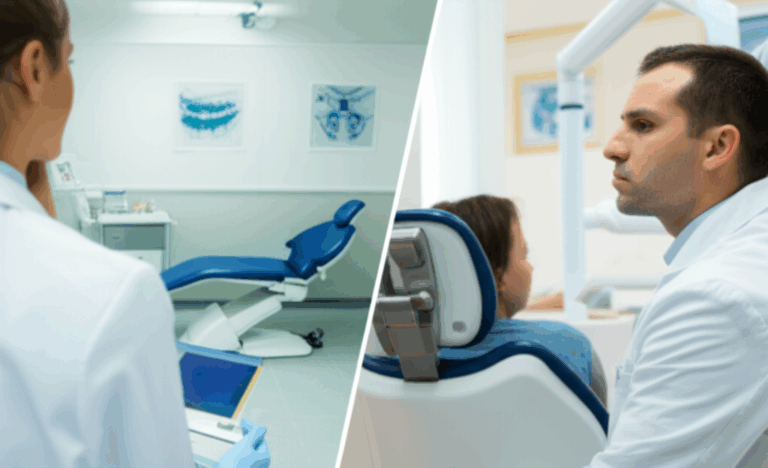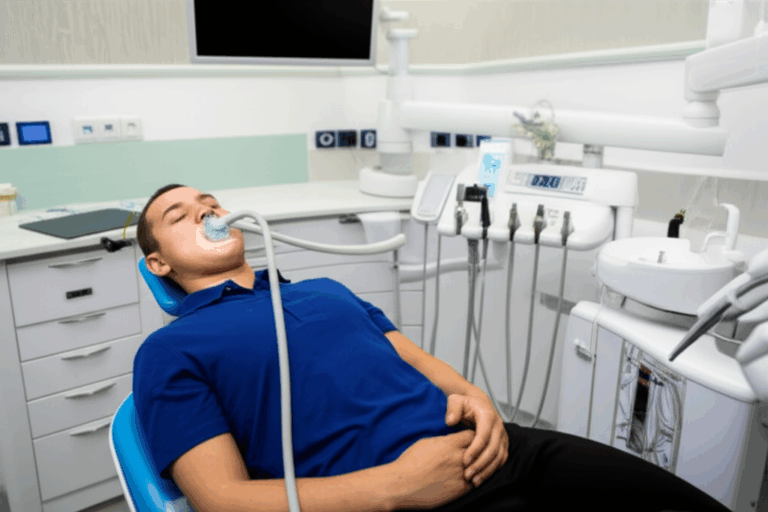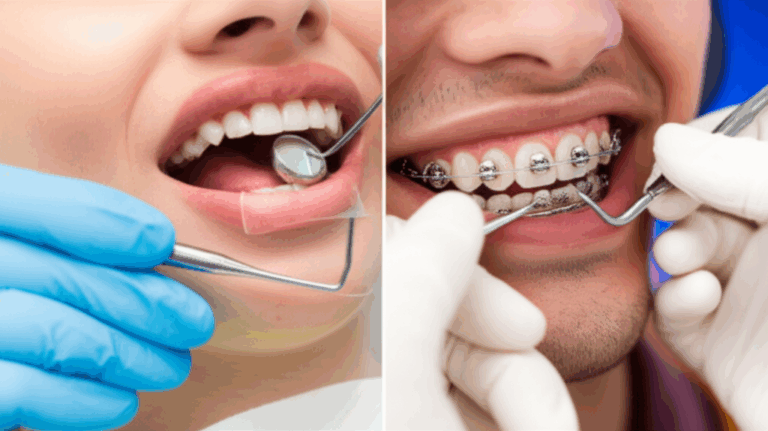
What is a Dentist? Your Essential Guide to Oral Health Professionals
Let’s be honest—most people don’t look forward to sitting in a dental chair or seeing the dentist. But almost everyone, at some point, wonders about the person helping care for their teeth. What is a dentist? Why do they look so closely in our mouths? And, maybe even more importantly, how can you work with your dentist to keep your mouth healthy and your smile bright?
If you’ve ever wondered, “What does a dentist actually do?” or “Is it really that important to go regularly?”—you’re not alone. Let’s break down what makes dentists the people who take care of our smiles, get rid of any confusion, and help you feel confident about taking care of your mouth.
In This Article
- The Core Role of a Dentist: What Do They Actually Do?
- A Day in the Life: Common Procedures and Responsibilities
- Becoming a Dentist: The Path to Expertise
- Types of Dentists: Specializations for Every Oral Health Need
- Why is Regular Dental Care Crucial? More Than Just a Pretty Smile
- When to See a Dentist: Beyond Just Pain
- Your Partner in Lifelong Oral Wellness
The Core Role of a Dentist: What Do They Actually Do?
Let’s start at the beginning. Think of your mouth like a busy city—teeth are the buildings, your gums are the ground, and your jaw is the strong base. Someone needs to take care of this “city,” right? That’s the dentist.
A dentist is a doctor who takes care of your mouth, teeth, and gums. But it’s not just about “fixing teeth.” Dentists are like detectives, teachers, and surgeons all in one.
Here’s how they help keep your mouth healthy:
- Diagnosis: Dentists look for problems—like cavities, gum disease, infections, or even mouth cancer. Like a detective with a magnifying glass, they watch for small issues before they turn into big ones.
- Treatment: Maybe you broke a tooth chewing something hard. Your dentist repairs the tooth, whether it’s with a simple filling, a crown, or a root canal.
- Prevention: Dentists and their helpers show you the best way to brush and floss, give tips for healthy habits, and use things like fluoride or sealants to stop problems before they get worse.
- Complete Care: They think about how your mouth looks, how it works, and how comfortable it feels, not just about fixing what hurts.
Dentists don’t work alone. Dental hygienists, assistants, and experts like orthodontists or oral surgeons are part of the team too.
A Day in the Life: Common Procedures and Responsibilities
You might picture a dentist’s day as nothing but drills and cleaning teeth. Each day is different, but here’s a look at what they do:
1. Routine Check-ups and Cleanings
Think of these like your car’s oil change. A hygienist usually starts by giving your teeth a deep clean to get rid of sticky plaque or tough tartar you can’t reach with a toothbrush. Then the dentist checks for problems like decay, gum disease, or anything strange.
2. Treating Cavities
Even if you brush every day, it’s easy to get cavities when things like sugar or not brushing well enough happen. Cavities are tiny holes where bacteria have eaten through your tooth’s hard outside. Dentists take out the bad part and fill the hole with a safe material.
3. Pulling Teeth
Sometimes a tooth is too damaged, crowded, or infected to keep. Then a dentist removes it. Don’t worry—with numbing medicine, it’s usually quick and doesn’t hurt.
4. Root Canals
If a tooth’s inside (the “pulp”) gets infected, a root canal takes out the bad part, cleans the inside, and seals it up to keep the tooth. It sounds scary, but it actually gets rid of pain.
5. Crowns and Bridges
If your tooth is cracked or weak, a crown—a hard cap—covers it. Bridges fill in spaces where teeth are missing, using nearby teeth or dental implants to hold them in place. Special labs, like a crown and bridge lab, make these so they fit well.
6. Cosmetic and Orthodontic Care
Want whiter or straighter teeth? Dentists can help with whitening, veneers, or clear aligners with help from an orthodontist. Special labs such as a veneer lab make these to fit your teeth just right. Braces and retainers help straighten teeth for a healthier smile.
7. Emergency Care
Break a tooth? Get an infection? Sometimes you need a dentist right away to stop pain or prevent bigger problems.
Becoming a Dentist: The Path to Expertise
You might ask, “How do you become a dentist?” It takes years of school, hard work, and wanting to help people.
1. Education
- Bachelor’s Degree: Most dentists get a college degree first, usually in a science subject.
- Dental Admission Test (DAT): This test is needed for dental school.
- Dental School: Four years of school earns you a Doctor of Dental Surgery (DDS) or Doctor of Medicine in Dentistry (DMD). Both mean the same thing—just different names.
2. License
After dental school, dentists must pass tests to prove they know their stuff—both written and hands-on—before they can work.
3. Specialized Training
Some become general dentists. But others choose to learn more, such as orthodontists or surgeons, which means 2-6 more years of special school and practice.
4. Keep Learning
Dentistry changes fast, with new tools and things like 3D scans or digital X-rays. Dentists keep learning so they can give you the best care.
Types of Dentists: Specializations for Every Oral Health Need
Did you know dentists can specialize in different things? Each type is like a player in a team, with their own job. Here are a few:
1. General Dentist
The main dentist you see for check-ups and simple fixes, and who sends you to a specialist if you need one.
2. Orthodontist
Sees people for braces or clear aligners to straighten teeth or fix jaw problems.
3. Oral & Maxillofacial Surgeon
Takes out wisdom teeth or does surgery on the jaw or face. Often works with dental implants too.
4. Pediatric Dentist
Works with children and teens, dealing with growing teeth and helping kids feel relaxed at the dentist.
5. Periodontist
Handles gum disease and more serious gum problems, plus places dental implants.
6. Endodontist
Does root canals and treats problems with the soft part inside your teeth.
7. Prosthodontist
Fixes or replaces missing teeth with things like crowns, bridges, dentures, or implants—often working with dental ceramics labs.
8. Public Health Dentist
Focuses on helping the whole community—like running school programs, making sure people get good dental care, and working on things like water fluoridation.
Why is Regular Dental Care Crucial? More Than Just a Pretty Smile
You might wonder, “Do I really have to see the dentist if nothing hurts?” The answer is yes. Healthy teeth are about more than nice looks or breath—your whole health depends on your mouth.
1. Stopping Big Problems Early
Leaving a small pain or bleeding gums alone can turn into losing teeth, bad infections, or big, expensive treatments later. Finding problems early is much easier—and cheaper.
2. Mouth and Body Health Are Connected
Did you know gum disease can make you more likely to get things like heart disease or diabetes, or have problems while pregnant? Keeping your mouth healthy helps your whole body.
3. Finding Serious Issues Early
Your dentist can spot things like mouth cancer—even if you have no pain—when they’re easy to handle.
4. Confidence and Eating
Healthy teeth let you chew food right, talk without trouble, and smile without worrying. Good teeth are good for your confidence and your health.
Some Fast Facts:
- 92% of US adults (age 20-64) have had cavities in permanent teeth.
- 47.2% of US adults (age 30 and up) have some gum disease.
- Most experts suggest visiting the dentist every 6 months.
Source: U.S. CDC; ADA; World Health Organization
When to See a Dentist: Beyond Just Pain
It’s easy to wait until something hurts before calling the dentist, but it’s much better to go before you’re in pain. Here’s when to go:
1. Regular Check-ups
Twice a year (every 6 months) is best for most people. If you get gum disease or have special needs, your dentist may ask to see you more often.
2. Signs You Shouldn’t Ignore
Things to watch for:
- Pain or sensitivity that won’t go away
- Gums that bleed or are swollen
- Bad breath that won’t go away
- Sores or lumps that don’t heal
- Changes in how your teeth look or line up
3. If You Want to Change Your Smile
Want whiter teeth, fix a gap, or repair a chip? Dentists offer ways to help.
4. Dental Emergencies
Break a tooth? Lose a tooth? In serious pain, or have swelling or pus? Call your dentist or an emergency dental clinic right away.
Your Partner in Lifelong Oral Wellness
Dentists aren’t just “people who fix teeth.” They’re your teammates, helping you stay healthy for life. They know what to look for, use the newest tools, and help you understand what’s happening with your teeth.
Easy Takeaways
- Dentists are trained to take care of your mouth and your overall health.
- They fix, spot, and help prevent problems—from small cavities to serious diseases.
- There are many dental specialties, from braces to surgery.
- Regular dental visits are about staying healthy, not just avoiding pain.
- You have lots of choices, from simple check-ups to new treatments and ways to improve your smile.
- Don’t wait for a problem—being on top of your dental care makes things much easier.
What Should You Do Next?
If it’s been a while since your last visit, or you have questions about a treatment, don’t put it off. Make that appointment, talk things over, and take charge of your health—one smile at a time.
Frequently Asked Questions About Dentists
Q: What’s the difference between a DDS and a DMD?
A: They’re both types of dental degrees. Both mean the dentist finished dental school and has the same skills—the name just depends on the school.
Q: Will it hurt?
A: Most dental care is not painful. Dentists use numbing medicine and gentle ways to make sure you’re comfortable. If you’re scared, let your dentist know—they have ways to help you relax.
Q: Are dental X-rays safe?
A: Yes. X-rays use very little radiation and help dentists find problems early, before they get bad.
Q: How do I choose the right dentist?
A: Look for someone with the right training, good reviews, and who makes you feel comfortable. It’s important to feel you can talk to them easily!
Q: Are dental materials safe?
A: Yes. Dentists only use materials that have been carefully tested. If you have questions, ask your dentist about other options and the facts.
Final Word: Clarity Over Complexity
Your mouth shows a lot about your health. Don’t be afraid to ask questions or find out what care is right for you. Dentists are here to help you feel good about your smile—every step of the way.
Your smile’s story is just beginning. Why not make it a happy one?
Medically reviewed by Dr. Jane Doe, DDS. Sources: American Dental Association, CDC, World Health Organization, U.S. Bureau of Labor Statistics.








